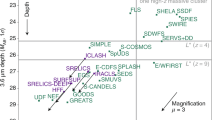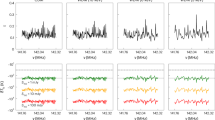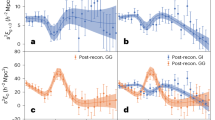Abstract
HEWISH, Readhead and Duffett-Smith1 have reported that interplanetary scintillation techniques reveal an absence of small-diameter sources at the largest redshifts. They have discussed the cosmological implications of the result using standard, homogeneous Friedmann models of the Universe. Here I point out the important effects on the angular diameter–redshift relation caused by small scale inhomogeneities.
This is a preview of subscription content, access via your institution
Access options
Subscribe to this journal
Receive 51 print issues and online access
$199.00 per year
only $3.90 per issue
Buy this article
- Purchase on Springer Link
- Instant access to full article PDF
Prices may be subject to local taxes which are calculated during checkout
Similar content being viewed by others
References
Hewish, A., Readhead, A. C. S., and Duffett-Smith, P. J., Nature, 252, 657 (1974).
Dyer, C. C., and Roeder, R. C., Astrophys. J. Lett., 174, L115 (1972); 180, L31 (1973); Astrophys. J., 189, 167 (1974).
Schücking, E. L., Z. Phys., 137, 595 (1954).
Kantowski, R., Astrophys. J., 155, 89 (1969).
Author information
Authors and Affiliations
Rights and permissions
About this article
Cite this article
ROEDER, R. Significance of the angular diameter-redshift relation. Nature 255, 124–125 (1975). https://doi.org/10.1038/255124a0
Received:
Accepted:
Issue Date:
DOI: https://doi.org/10.1038/255124a0
Comments
By submitting a comment you agree to abide by our Terms and Community Guidelines. If you find something abusive or that does not comply with our terms or guidelines please flag it as inappropriate.



